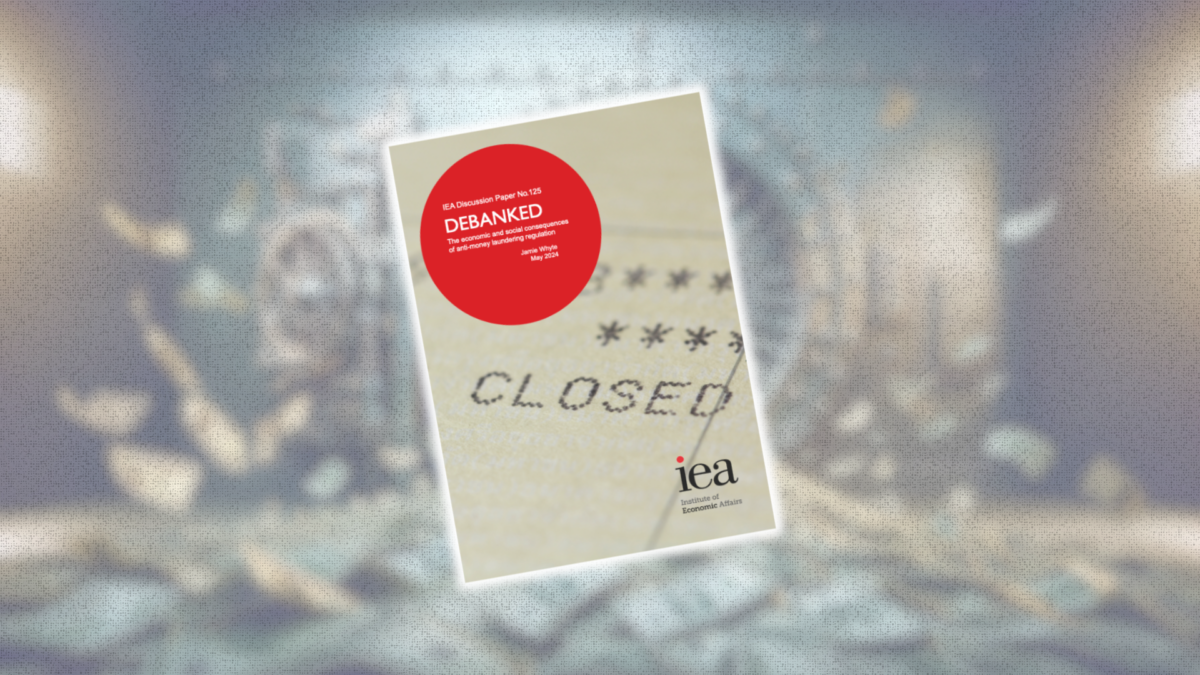Debanking epidemic fuelled by red tape, finds new IEA paper
SUGGESTED

Harrison Griffiths writes for The Spectator


- After the government introduced new anti-money laundering (AML) rules in 2017, the number of bank accounts closed increased by 7.5 times (from 45,000 in 2016-17 to 343,000 in 2021-22).
- 170,000 accounts were closed in 2021/22 because banks could not prove that customers were not involved in money laundering or other financial crimes.
- AML enforcement costs banks £34 billion annually, almost double the total budget for policing across the United Kingdom, despite no evidence that the rules reduce crime.
- In 2021/22, for every person convicted of money laundering, 169 people had their bank accounts closed for failure to comply with AML regulations.
Nigel Farage’s high-profile debanking is just the tip of the iceberg, according to a new discussion paper from the Institute of Economic Affairs (IEA). The free market think tank’s report finds that hundreds of thousands of innocent individuals and businesses are losing their bank accounts due to burdensome government regulations.
Author and IEA Senior Research Fellow Dr Jamie Whyte says that while politicised debanking cases like Farage’s are “vanishingly rare,” the UK’s increasingly stringent anti-money laundering (AML) regulations are forcing banks to close accounts of innocent customers en masse.
The rules require banks to conduct extensive due diligence on their customers. Failure to comply can result in massive fines, reaching hundreds of millions or even billions of pounds, and the responsible bank employees can also lose their jobs.
In many cases, banks have been fined not because any actual money laundering has been detected but because a regulator has determined the procedures are not up to scratch. The report argues that the increased risk of fines has incentivised banks to shut hundreds of thousands of accounts in response.
“Certain kinds of customers present a relatively high prima facie risk of being involved in money laundering,” Whyte writes. “But the cost of discovering whether they really are criminals would exceed the value of their business. So, banks close their accounts – even though most of those people are innocent.”
Whyte suggests several categories of people are more likely to face debanking, including charities, small companies operating in developing economies, expats, and Politically Exposed Persons (PEPs). He writes that the “regulations drive up the cost and difficulty of making international payments to and from many poor countries.” Therefore, they “make poor people yet worse off and impede economic development”.
The report highlights evidence that AML rules compliance costs banks £34 billion annually. These costs are passed onto customers through higher account fees, higher loan interest rates, and lower deposit interest rates.
“The AML obligations imposed on banks have massive costs and no apparent benefit in reducing crime,” Whyte continues. For example, the single largest source of money laundering, the illegal drug trade, has increased by 60% since global AML regulations were first introduced in 1990.
Whyte rejects new rules requiring banks to provide accounts on the basis that private businesses should be able to decide their customers. Nevertheless, the report says that problematic regulations — namely, the Money Laundering, Terrorist Financing and Transfer of Funds (Information on the Payer) Regulations 2017 — should be withdrawn with a return to the pre-2017 regulatory regime. Whyte also recommends that banks should be compensated for the large compliance costs if the government does not undo the regulations.
Dr Jamie Whyte, report author and IEA Senior Research Fellow, said:
“The UK’s overly stringent anti-money laundering regime, which threatens banks with massive fines, is forcing them to close the accounts of tens of thousands of innocent customers. People are losing access to their bank accounts simply because the cost of proving their innocence is too high for banks given the relatively small profit made from a typical account.
“The government should repeal the 2017 regulations. Private businesses like banks should not be forced to act as an unpaid police force, doling out penalties in the form of account closures without needing to meet the evidential standards applied in criminal trials.”
Sammy Wilson, Democratic Unionist Party MP for East Antrim and member of the All-Party Parliamentary Group (APPG) on Fair Business Banking:
“Decisions to debank individuals, businesses and community groups have devastating results. It’s equivalent to putting a stranglehold on them, cutting off their vital economic oxygen supply. I have had community groups and small businesses contact me after finding their banking facilities closed without notice, some of them unable to continue operating. For some their only source of income were public sector grants so there was no question of them laundering money. Also they had been customers above suspicion for years with the same bank.
“We’ve all become familiar with clear cases where individuals and organisations have had accounts closed because someone in the bank decided they disagree with the views of the customer. This paper shines a bright light on less discussed debanking cases caused by badly thought out and overbearing regulation by a Conservative government which promised to reduce red tape and set the economy free. This is one of the ironies of the debanking scandal.”
Henry Smith, Conservative MP for Crawley and member of the APPG on Investment Fraud & Fair Financial Services, said:
“Tackling money laundering and illegal financial practices is vital for confidence and security in the system but it does need to be balanced and better targeted. An extraordinary 170,000 bank accounts were closed in 2021/2022 alone, following new regulations introduced in 2017, suggesting that intelligence based targeting of financial crime is not effectively working. Too many innocent people and businesses are getting caught up by these broad powers, causing unfair, serious inconvenience at best, and worse negatively affecting legitimate economic activity. A review of regulations is needed.”
John Baron, Conservative MP for Basildon and Billericay, said:
“Whilst the report suggests that there is little sign that de-banking for political reasons is taking place, it highlights the scale of de-banking due to anti-money laundering regulations which is out of proportion to the relatively low numbers of people convicted for money laundering each year.
“If anti-money laundering regulations are leading banks to rational commercial decisions which result in the involuntary closures of nearly 170,000 personal accounts each year, then something has gone wrong. I hope the Government and the regulators will study this report closely.”
Alexander Stafford, Conservative MP for Rother Valley, said:
“This publication sheds light on a critical issue: the unintended consequences of anti-money laundering regulations. While well-intentioned, these rules have led to an alarming number of innocent individuals and businesses losing their bank accounts. Leaving them unable to work or live, while criminals continue to bypass these rules to launder their ill-gotten gains.
“The burden placed on banks and their customers is disproportionate and unjust. It’s time to reform these regulations to protect law-abiding customers and foster a freer, more prosperous economy. The IEA’s paper is a wake-up call we cannot ignore.”
ENDS
Notes to Editors
Contact: media@iea.org.uk / 07763 365520
Read a full copy of Debanked: The economic and social consequences of anti-money laundering regulation.
Politically Exposed Persons include government ministers, members of parliament, senior civil servants, and judges. They also include the close relatives and business associates of PEPs.
About the Author
Jamie Whyte is a partner at CAP, a litigation risk management startup. He is the former Research Director at the Institute of Economic Affairs. Prior to joining the IEA, Jamie was the leader of ACT New Zealand as well as the Head of Research and Publishing at Oliver Wyman Financial Services. He has previously worked as a management consultant for the Boston Consulting Group, as a philosophy lecturer at Cambridge University and as a foreign currency trader.
The mission of the Institute of Economic Affairs is to improve understanding of the fundamental institutions of a free society by analysing and expounding the role of markets in solving economic and social problems. The IEA is a registered educational charity and independent of all political parties.



